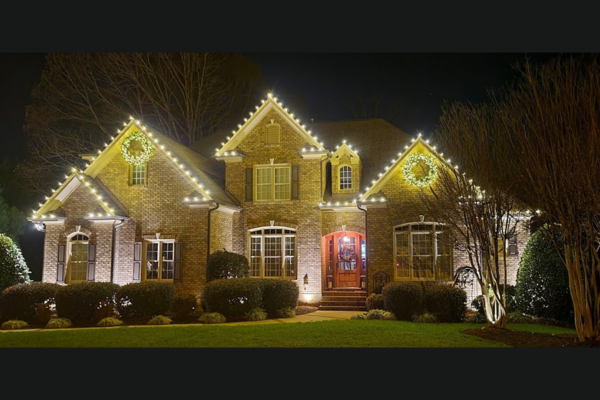Blog
Our Top Blog Posts

Shining a Light on Legal Structures: Which One is Best for Your Christmas Light Installation Business?
When starting a Christmas light installation business, one of the most crucial decisions you'll make is choosing the right legal structure. The legal structure you select will have significant implications for your business, affecting everything from your personal liability to your tax obligations and ability to raise capital. In this blog post, we'll explore the most common legal structures for small businesses and help you determine which one is the best fit for your Christmas light installation venture.
Sole Proprietorship
A sole proprietorship is the simplest and most common legal structure for small businesses. As a sole proprietor, you and your business are considered one and the same legal entity. This means that you have complete control over your business decisions and operations, but it also means that you are personally liable for any debts or legal issues that may arise.
Advantages:
1. Easy and inexpensive to set up
2. Complete control over business decisions
3. Simplified tax reporting (business income is reported on your personal tax return)
Disadvantages:
1. Unlimited personal liability for business debts and legal issues
2. Difficulty raising capital, as investors may be hesitant to invest in a business with unlimited personal liability
3. Limited life span (the business ends if the owner dies or decides to close the business)
For a Christmas light installation business, a sole proprietorship may be a good choice if you're just starting and plan to operate on a small scale with minimal risk exposure. However, as your business grows and takes on more clients and employees, you may want to consider a legal structure that offers more personal liability protection.

Partnership
A partnership is a legal structure in which two or more individuals share ownership of the business. There are two main types of partnerships: general partnerships and limited partnerships.
In a general partnership, all partners have equal responsibility for managing the business and are personally liable for its debts and legal issues. In a limited partnership, there are two classes of partners: general partners who manage the business and have unlimited personal liability, and limited partners who invest in the business but have limited involvement in its operations and limited personal liability.
Advantages:
1. Easy and inexpensive to set up
2. Shared responsibility for managing the business
3. Potential for increased capital, as multiple partners can contribute resources
Disadvantages:
1. Unlimited personal liability for general partners
2. Potential for conflicts between partners
3. More complex tax reporting, as the business must file a separate tax return and each partner reports their share of income on their personal tax return
For a Christmas light installation business, a partnership may be a good choice if you have a trusted business partner with complementary skills and resources. However, it's essential to have a clear partnership agreement in place that outlines each partner's roles, responsibilities, and profit-sharing arrangements to avoid potential conflicts down the line.

Limited Liability Company (LLC)
A limited liability company (LLC) is a legal structure that combines the personal liability protection of a corporation with the tax benefits and operational flexibility of a partnership. As an LLC owner (known as a member), you are not personally liable for the business's debts or legal issues, unless you engage in fraudulent or illegal activities.
Advantages:
1. Personal liability protection for members
2. Flexible management structure (can be managed by members or appointed managers)
3. Pass-through taxation (business income is reported on members' personal tax returns)
Disadvantages:
1. More complex and expensive to set up than a sole proprietorship or partnership
2. Potential for self-employment taxes on members' share of business income
3. Less attractive to investors compared to a corporation
For a Christmas light installation business, an LLC may be the best choice if you want to protect your personal assets from business liabilities while maintaining operational flexibility. It's a good middle ground between the simplicity of a sole proprietorship and the formality of a corporation.

Corporation
A corporation is a legal entity separate from its owners, known as shareholders. There are two main types of corporations: C corporations and S corporations.
C corporations are subject to double taxation, meaning the business pays taxes on its income, and shareholders pay taxes on any dividends they receive. S corporations, on the other hand, offer pass-through taxation similar to an LLC but have more stringent requirements for ownership and profit-sharing.
Advantages:
1. Personal liability protection for shareholders
2. Ability to raise capital through the sale of stock
3. Perpetual existence (the business continues even if ownership changes)
Disadvantages:
1. More complex and expensive to set up and maintain than other legal structures
2. Double taxation for C corporations
3. Stringent requirements for S corporation status
For a Christmas light installation business, a corporation may be overkill in terms of complexity and cost, unless you plan to grow significantly and seek outside investment. However, if you do choose to structure your business as a corporation, an S corporation may be more advantageous than a C corporation due to its pass-through taxation benefits.
Factors to Consider When Choosing a Legal Structure
When deciding on the right legal structure for your Christmas light installation business, consider the following factors:
1. Personal liability protection: How much risk are you willing to take on personally? If you want to shield your personal assets from business liabilities, an LLC or corporation may be the best choice.
2. Tax implications: Consider how each legal structure will affect your tax obligations. Sole proprietorships and partnerships offer simple tax reporting, while LLCs and S corporations provide pass-through taxation. C corporations are subject to double taxation.
3. Operational flexibility: Think about how much control you want over your business decisions and operations. Sole proprietorships and LLCs offer the most flexibility, while partnerships and corporations may require more formal decision-making processes.
4. Ability to raise capital: If you plan to seek outside investment, a corporation may be more attractive to investors than other legal structures.
5. Administrative complexity and costs: Consider the time and money required to set up and maintain each legal structure. Sole proprietorships and partnerships are the simplest and least expensive, while LLCs and corporations involve more paperwork and fees.
Consulting with a Professional
Choosing the right legal structure for your Christmas light installation business is a significant decision that shouldn't be taken lightly. While this blog post provides a general overview of the most common legal structures and their advantages and disadvantages, it's essential to consult with a qualified legal and tax professional to determine the best choice for your specific situation.
A business attorney can help you understand the legal implications of each structure and draft the necessary paperwork to set up your chosen entity. An accountant or tax professional can advise you on the tax consequences of each structure and help you develop a tax strategy that maximizes your business's profitability.

Selecting the right legal structure is a critical step in starting your Christmas light installation business. By understanding the advantages and disadvantages of each structure and considering factors such as personal liability protection, tax implications, operational flexibility, and ability to raise capital, you can make an informed decision that sets your business up for success.
Remember, the legal structure you choose now isn't set in stone. As your business grows and evolves, you may need to reassess your legal structure to ensure it still aligns with your goals and needs. By staying informed and seeking professional guidance when needed, you can navigate the legal landscape of business ownership with confidence and focus on what you do best – bringing joy and light to your clients' holiday seasons.

1. Q: What is a sole proprietorship?
A: A sole proprietorship is the simplest legal structure where the business and owner are considered one legal entity, giving the owner complete control but also personal liability for the business's debts and legal issues.
2. Q: What are the two main types of partnerships?
A: The two main types of partnerships are general partnerships, where all partners have equal responsibility and personal liability, and limited partnerships, which have both general partners and limited partners with restricted involvement and liability.
3. Q: What is an LLC, and what are its advantages?
A: An LLC, or limited liability company, combines the personal liability protection of a corporation with the tax benefits and flexibility of a partnership, making it an attractive choice for many small business owners.
4. Q: What are the two main types of corporations?
A: The two main types of corporations are C corporations, which are subject to double taxation, and S corporations, which offer pass-through taxation but have more stringent ownership and profit-sharing requirements.
5. Q: What are the main factors to consider when choosing a legal structure?
A: The main factors to consider when choosing a legal structure include personal liability protection, tax implications, operational flexibility, ability to raise capital, and administrative complexity and costs.
6. Q: Which legal structure offers the most personal liability protection?
A: LLCs and corporations offer the most personal liability protection for business owners, shielding personal assets from business liabilities.
7. Q: Which legal structure is the simplest and least expensive to set up?
A: Sole proprietorships and partnerships are the simplest and least expensive legal structures to set up, requiring minimal paperwork and fees.
8. Q: Which legal structure is most attractive to outside investors?
A: Corporations are generally the most attractive legal structure to outside investors, as they allow for the sale of stock to raise capital.
9. Q: Can a business change its legal structure over time?
A: Yes, as a business grows and evolves, owners may need to reassess their legal structure to ensure it aligns with their goals and needs.
10. Q: Why is it essential to consult with a legal and tax professional when choosing a legal structure?
A: Consulting with a qualified legal and tax professional can help business owners understand the legal implications and tax consequences of each structure, ensuring they make an informed decision that best suits their specific situation.


Shining a Light on Legal Structures: Which One is Best for Your Christmas Light Installation Business?
When starting a Christmas light installation business, one of the most crucial decisions you'll make is choosing the right legal structure. The legal structure you select will have significant implications for your business, affecting everything from your personal liability to your tax obligations and ability to raise capital. In this blog post, we'll explore the most common legal structures for small businesses and help you determine which one is the best fit for your Christmas light installation venture.
Sole Proprietorship
A sole proprietorship is the simplest and most common legal structure for small businesses. As a sole proprietor, you and your business are considered one and the same legal entity. This means that you have complete control over your business decisions and operations, but it also means that you are personally liable for any debts or legal issues that may arise.
Advantages:
1. Easy and inexpensive to set up
2. Complete control over business decisions
3. Simplified tax reporting (business income is reported on your personal tax return)
Disadvantages:
1. Unlimited personal liability for business debts and legal issues
2. Difficulty raising capital, as investors may be hesitant to invest in a business with unlimited personal liability
3. Limited life span (the business ends if the owner dies or decides to close the business)
For a Christmas light installation business, a sole proprietorship may be a good choice if you're just starting and plan to operate on a small scale with minimal risk exposure. However, as your business grows and takes on more clients and employees, you may want to consider a legal structure that offers more personal liability protection.

Partnership
A partnership is a legal structure in which two or more individuals share ownership of the business. There are two main types of partnerships: general partnerships and limited partnerships.
In a general partnership, all partners have equal responsibility for managing the business and are personally liable for its debts and legal issues. In a limited partnership, there are two classes of partners: general partners who manage the business and have unlimited personal liability, and limited partners who invest in the business but have limited involvement in its operations and limited personal liability.
Advantages:
1. Easy and inexpensive to set up
2. Shared responsibility for managing the business
3. Potential for increased capital, as multiple partners can contribute resources
Disadvantages:
1. Unlimited personal liability for general partners
2. Potential for conflicts between partners
3. More complex tax reporting, as the business must file a separate tax return and each partner reports their share of income on their personal tax return
For a Christmas light installation business, a partnership may be a good choice if you have a trusted business partner with complementary skills and resources. However, it's essential to have a clear partnership agreement in place that outlines each partner's roles, responsibilities, and profit-sharing arrangements to avoid potential conflicts down the line.

Limited Liability Company (LLC)
A limited liability company (LLC) is a legal structure that combines the personal liability protection of a corporation with the tax benefits and operational flexibility of a partnership. As an LLC owner (known as a member), you are not personally liable for the business's debts or legal issues, unless you engage in fraudulent or illegal activities.
Advantages:
1. Personal liability protection for members
2. Flexible management structure (can be managed by members or appointed managers)
3. Pass-through taxation (business income is reported on members' personal tax returns)
Disadvantages:
1. More complex and expensive to set up than a sole proprietorship or partnership
2. Potential for self-employment taxes on members' share of business income
3. Less attractive to investors compared to a corporation
For a Christmas light installation business, an LLC may be the best choice if you want to protect your personal assets from business liabilities while maintaining operational flexibility. It's a good middle ground between the simplicity of a sole proprietorship and the formality of a corporation.

Corporation
A corporation is a legal entity separate from its owners, known as shareholders. There are two main types of corporations: C corporations and S corporations.
C corporations are subject to double taxation, meaning the business pays taxes on its income, and shareholders pay taxes on any dividends they receive. S corporations, on the other hand, offer pass-through taxation similar to an LLC but have more stringent requirements for ownership and profit-sharing.
Advantages:
1. Personal liability protection for shareholders
2. Ability to raise capital through the sale of stock
3. Perpetual existence (the business continues even if ownership changes)
Disadvantages:
1. More complex and expensive to set up and maintain than other legal structures
2. Double taxation for C corporations
3. Stringent requirements for S corporation status
For a Christmas light installation business, a corporation may be overkill in terms of complexity and cost, unless you plan to grow significantly and seek outside investment. However, if you do choose to structure your business as a corporation, an S corporation may be more advantageous than a C corporation due to its pass-through taxation benefits.
Factors to Consider When Choosing a Legal Structure
When deciding on the right legal structure for your Christmas light installation business, consider the following factors:
1. Personal liability protection: How much risk are you willing to take on personally? If you want to shield your personal assets from business liabilities, an LLC or corporation may be the best choice.
2. Tax implications: Consider how each legal structure will affect your tax obligations. Sole proprietorships and partnerships offer simple tax reporting, while LLCs and S corporations provide pass-through taxation. C corporations are subject to double taxation.
3. Operational flexibility: Think about how much control you want over your business decisions and operations. Sole proprietorships and LLCs offer the most flexibility, while partnerships and corporations may require more formal decision-making processes.
4. Ability to raise capital: If you plan to seek outside investment, a corporation may be more attractive to investors than other legal structures.
5. Administrative complexity and costs: Consider the time and money required to set up and maintain each legal structure. Sole proprietorships and partnerships are the simplest and least expensive, while LLCs and corporations involve more paperwork and fees.
Consulting with a Professional
Choosing the right legal structure for your Christmas light installation business is a significant decision that shouldn't be taken lightly. While this blog post provides a general overview of the most common legal structures and their advantages and disadvantages, it's essential to consult with a qualified legal and tax professional to determine the best choice for your specific situation.
A business attorney can help you understand the legal implications of each structure and draft the necessary paperwork to set up your chosen entity. An accountant or tax professional can advise you on the tax consequences of each structure and help you develop a tax strategy that maximizes your business's profitability.

Selecting the right legal structure is a critical step in starting your Christmas light installation business. By understanding the advantages and disadvantages of each structure and considering factors such as personal liability protection, tax implications, operational flexibility, and ability to raise capital, you can make an informed decision that sets your business up for success.
Remember, the legal structure you choose now isn't set in stone. As your business grows and evolves, you may need to reassess your legal structure to ensure it still aligns with your goals and needs. By staying informed and seeking professional guidance when needed, you can navigate the legal landscape of business ownership with confidence and focus on what you do best – bringing joy and light to your clients' holiday seasons.

1. Q: What is a sole proprietorship?
A: A sole proprietorship is the simplest legal structure where the business and owner are considered one legal entity, giving the owner complete control but also personal liability for the business's debts and legal issues.
2. Q: What are the two main types of partnerships?
A: The two main types of partnerships are general partnerships, where all partners have equal responsibility and personal liability, and limited partnerships, which have both general partners and limited partners with restricted involvement and liability.
3. Q: What is an LLC, and what are its advantages?
A: An LLC, or limited liability company, combines the personal liability protection of a corporation with the tax benefits and flexibility of a partnership, making it an attractive choice for many small business owners.
4. Q: What are the two main types of corporations?
A: The two main types of corporations are C corporations, which are subject to double taxation, and S corporations, which offer pass-through taxation but have more stringent ownership and profit-sharing requirements.
5. Q: What are the main factors to consider when choosing a legal structure?
A: The main factors to consider when choosing a legal structure include personal liability protection, tax implications, operational flexibility, ability to raise capital, and administrative complexity and costs.
6. Q: Which legal structure offers the most personal liability protection?
A: LLCs and corporations offer the most personal liability protection for business owners, shielding personal assets from business liabilities.
7. Q: Which legal structure is the simplest and least expensive to set up?
A: Sole proprietorships and partnerships are the simplest and least expensive legal structures to set up, requiring minimal paperwork and fees.
8. Q: Which legal structure is most attractive to outside investors?
A: Corporations are generally the most attractive legal structure to outside investors, as they allow for the sale of stock to raise capital.
9. Q: Can a business change its legal structure over time?
A: Yes, as a business grows and evolves, owners may need to reassess their legal structure to ensure it aligns with their goals and needs.
10. Q: Why is it essential to consult with a legal and tax professional when choosing a legal structure?
A: Consulting with a qualified legal and tax professional can help business owners understand the legal implications and tax consequences of each structure, ensuring they make an informed decision that best suits their specific situation.

Copyright ©2026 All Right Reserved website designed by christmaslights.io
Terms of Service / Privacy Policy
Have questions or need assistance?
Contact us at (855)619-LITE


